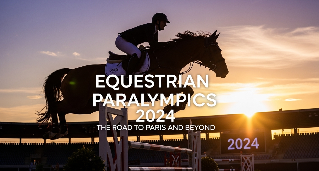equestrian paralympics 2024 2024: The Road to Paris and Beyond

As the world gears up for the 2024 Paralympic Games in Paris, one of the most inspiring and visually stunning disciplines takes center stage—equestrian sports. The equestrian paralympics 2024 2024 promises to showcase incredible athleticism, resilience, and a deep bond between athletes and their equine partners. For fans, athletes, and newcomers alike, understanding the nuances of this event is vital. Let’s dive into what makes the Equestrian Paralympics 2024 so compelling, from the sport’s history and classification system to the athletes’ stories and what to expect in Paris.
The Significance of Equestrian Sports in the Paralympics
Equestrian sports were officially introduced into the Paralympic Games in 1996 in Atlanta, marking a significant milestone in inclusive sports. Unlike many other disciplines, equestrian at the Paralympics emphasizes harmony between rider and horse, where technical skill, adaptability, and emotional connection matter just as much as physical prowess.
The inclusion of equestrian events underscores the Games’ commitment to showcasing diverse athletic talents. It also highlights how adaptive sports can challenge perceptions about disability, demonstrating that with the right support and training, athletes can compete at the highest levels regardless of physical limitations.
In 2024, the Equestrian Paralympics will once again champion this ethos, with new records, inspiring stories, and innovative approaches to training and competition. The event exemplifies the spirit of resilience and the universal language of connection that transcends physical boundaries.
A Deep Dive into the Equestrian Paralympic Disciplines
Dressage: The Heart of Paralympic Equestrian Sports
Dressage is the core discipline within the Paralympics equestrian program. Think of it as a highly refined ballet performed on horseback, where precision, control, and harmony are vital. Athletes perform a series of predetermined movements called “tests,” which are judged on accuracy, grace, and consistency.
For the 2024 Games, the dressage competition will feature several classifications, ranging from Grade I (for athletes with severe impairments) to Grade IV (for athletes with less severe impairments). Each grade has a tailored set of movements designed to assess each athlete’s abilities within their functional capacity.
Para-Equestrian Event Structure
The event structure is meticulously designed to ensure fairness and competitiveness. Here’s a simplified overview:
| Grade | Description | Key Characteristics |
|---|---|---|
| Grade I | Severe impairments affecting all limbs | Focus on minimal movement, often seated in wheelchairs |
| Grade II | Significant impairment, some limb control | Movements with assistive aids or modifications |
| Grade III | Moderate impairment | Greater mobility, more complex movements |
| Grade IV | Mild impairments or coordination issues | Close to able-bodied dressage standards |
The classification system is crucial because it levels the playing field, allowing athletes with different disabilities to compete fairly against peers with similar functional abilities.
The Road to Paris: Qualification and Preparation
Qualification Pathways
Qualification for the equestrian paralympics 2024 2024 is rigorous, involving a mix of international competitions, regional qualifiers, and rankings. Here’s an outline of how athletes secure their spots:
- World Championships: Held every four years, these serve as primary qualifying events.
- Regional Championships: Europe, Americas, Asia-Pacific, and Africa each host regional qualifiers.
- World Ranking List: Athletes accumulating points through consistent performance can qualify via rankings.
- Host Nation Quota: France, as the host, has a reserved spot to ensure local representation.
Training and Adaptation in the Lead-Up to Paris
Preparation for the Paralympics isn’t just about physical training; it involves a comprehensive approach:
- Horse Athlete Compatibility: Finding the right horse is fundamental. Some athletes train with multiple horses before identifying their ideal partner.
- Customized Training Regimens: Athletes work with coaches specializing in adaptive sports, focusing on mobility, balance, and precision.
- Mental Conditioning: The pressure of the Paralympics demands mental resilience. Many athletes incorporate mindfulness and visualization techniques.
- Innovative Equipment: Adaptive tack, supportive gear, and technology-assisted aids play a significant role in enhancing performance.
Notable Athletes to Watch
While many talented riders are vying for medals, a few stand out based on recent performances:
- Sarah Rose (Great Britain): Known for her exceptional consistency and innovative training approach.
- Marcelo Silva (Brazil): A rising star with a compelling story of overcoming adversity.
- Elena Novak (Germany): Multiple-time Paralympic medalist, renowned for her grace and technical precision.
The Significance of the 2024 Host City: Paris
Paris isn’t just hosting the Olympics; the city is making a bold statement in the realm of inclusive sports. The venues for the Equestrian Paralympics will be thoughtfully selected for accessibility and ambiance, blending historic sites with modern facilities.
Hosting the Games in Paris also emphasizes the global movement toward inclusivity. The city’s rich equestrian history, with iconic venues like the Versailles Equestrian Center, sets a scenic and culturally meaningful backdrop for the competitions.
Moreover, Paris 2024 aims to promote awareness beyond the Games, inspiring local communities and future athletes through outreach programs, adaptive riding clinics, and educational initiatives.
What to Expect at the equestrian paralympics 2024 2024 Spectator
Experience
Attending the Equestrian Paralympics in Paris promises an immersive experience. Expect:
- Close-up Engagement: Spectator zones will be designed to facilitate interaction, allowing viewers to appreciate the skill and bond between riders and horses.
- Live Demonstrations and Workshops: These will showcase adaptive riding techniques and educate audiences about the sport’s nuances.
- Cultural Integration: The event will feature Parisian art, music, and food, creating a festival-like atmosphere that celebrates diversity and resilience.
Broadcast and Digital Engagement
For those unable to attend in person, extensive broadcast coverage and digital streaming will ensure global access. Real-time updates, athlete profiles, and behind-the-scenes content will deepen viewers’ understanding and appreciation of the sport.
The Impact on Future Athletes
The visibility of the equestrian paralympics 2024 2024 is expected to inspire a new generation of riders with disabilities. Increased media coverage, grassroots programs, and school outreach aim to foster inclusivity and participation.
The Broader Impact: Why Equestrian Paralympics Matter
Promoting Inclusivity and Changing Perceptions
The Equestrian Paralympics demonstrate that physical limitations do not define an athlete’s potential. Success stories from this sport challenge stereotypes and promote a broader societal understanding of disability.
Advancing Adaptive Sports Technology
Innovations in adaptive tack, support aids, and training methodologies emerging from Paralympic preparations often trickle into mainstream equestrian sport, advancing the entire industry.
Building Community and Resilience
The camaraderie among athletes, coaches, and supporters fosters a global community rooted in resilience, determination, and shared passion. This collective spirit extends beyond sports, influencing societal attitudes toward disability.
Final Thoughts: The Legacy of equestrian paralympics 2024 2024
As the countdown to Paris 2024 progresses, the Equestrian Paralympics stands as a testament to human resilience and the transformative power of sports. It’s more than a competition; it’s a celebration of adaptability, partnership, and perseverance.
The event will undoubtedly leave a lasting legacy—both in terms of inspiring future athletes and in shaping inclusive attitudes worldwide. Whether you’re an equestrian enthusiast or a curious newcomer, witnessing the equestrian paralympics 2024 2024 promises to be an uplifting experience that redefines what’s possible.
Frequently Asked Questions
Q1: How are athletes classified in Paralympic equestrian sports?
A1: Athletes are classified based on their functional abilities, from Grade I (most severe impairments) to Grade IV (least impairments). The classification ensures fair competition tailored to each athlete’s level of mobility and coordination.
Q2: Can anyone participate in Paralympic equestrian events?
A2: Not quite. Participants must meet specific qualification criteria, including performance standards, classification assessments, and qualification events. It’s a rigorous process designed to maintain high competition standards.
Q3: Are horses also trained and selected specifically for the Paralympics?
A3: Absolutely. Horses are carefully matched with riders based on temperament, training, and compatibility. Many Paralympic horses have extensive experience in adaptive riding and are trained to respond to unique cues.
Q4: How does adaptive equipment assist Paralympic riders?
A4: Adaptive tack, supportive gear, and technological aids help compensate for physical limitations, enabling athletes to perform with greater control and stability. These innovations are continually evolving to enhance performance and safety.
Q5: Why is Paris 2024 considered a historic location for the Games?
A5: Paris combines rich history, cultural significance, and modern infrastructure, making it an ideal backdrop for the Paralympics. The city’s commitment to accessibility and inclusivity further elevates its status as a host city.
Q6: How can I get involved or support Paralympic equestrian sports?
A6: You can support through donations, volunteering at events, promoting awareness on social media, or participating in adaptive riding programs in your community. Every effort helps grow the sport and inspire athletes.
The equestrian paralympics 2024 2024 is poised to be a landmark event, exemplifying courage, skill, and unity. As we approach Paris, the anticipation builds for a celebration that transcends sport—highlighting what it truly means to overcome, connect, and excel.



